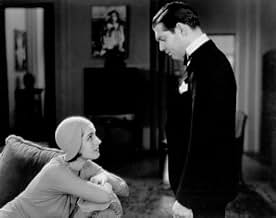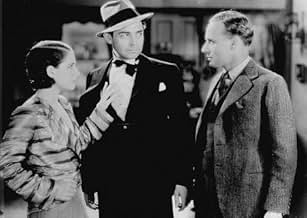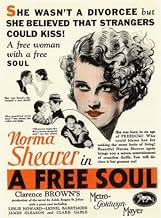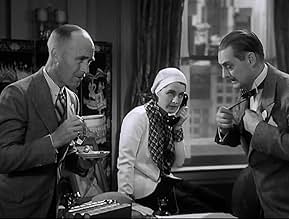AVALIAÇÃO DA IMDb
6,6/10
3,1 mil
SUA AVALIAÇÃO
Um advogado alcoólatra que defendeu com sucesso um jogador em uma acusação de homicídio objeta quando sua filha se envolve romanticamente com ele.Um advogado alcoólatra que defendeu com sucesso um jogador em uma acusação de homicídio objeta quando sua filha se envolve romanticamente com ele.Um advogado alcoólatra que defendeu com sucesso um jogador em uma acusação de homicídio objeta quando sua filha se envolve romanticamente com ele.
- Direção
- Roteiristas
- Artistas
- Ganhou 1 Oscar
- 4 vitórias e 2 indicações no total
Roscoe Ates
- Man Shot at in Men's Room
- (não creditado)
Ann Brody
- Hamburger Saleslady
- (não creditado)
Edward Brophy
- Slouch
- (não creditado)
Clarence Burton
- Detective
- (não creditado)
James Donlan
- Reporter
- (não creditado)
Bess Flowers
- Birthday Party Guest
- (não creditado)
Francis Ford
- Skid Row Drunk
- (não creditado)
Henry Hall
- Detective in Raid
- (não creditado)
George Irving
- Johnson - Defense Attorney
- (não creditado)
Edward LeSaint
- Judge
- (não creditado)
Eric Mayne
- Party Guest
- (não creditado)
Sam McDaniel
- Casino Valet
- (não creditado)
Avaliações em destaque
I thought A Free Soul an interesting exploration into the world of addiction--father Stephen Ashe, as played by Lionel Barrymore, struggles to balance his career as a defense lawyer and the disastrous effects his alcoholism has on his family and social life. Daughter Jan (Norma Shearer) has a similar problem--but her addiction is to a free and easy lifestyle, with no commitments and no responsibility. Both seem to be ways of dealing with an unspoken loss--perhaps that of a wife and mother. Again, as with all good storytelling, backstory is only hinted at but the characters are rich enough to imply a great deal of history. Refreshing to see Clark Gable as a suave, handsome but ultimately despicable character. A surprising lack of stereotypes for such a film-the Ashes are a patrician, proper family who virtually disown Stephen and his daughter, but they are shown to be intelligent, unique people none the less. A wonderful, melodramatic exploration of the relationship of a father and daughter. Some nice location work for an early talkie.
A Free Soul (1931)
Clark Gable says, "I'm telling you." And Norma Shearer, dressed in a sexy silk dress, replies, "Oh no, you're not. Nobody is."
That sums up this astonishing movie. I can't believe A Free Soul is so little known, or that so many viewers don't get the depth of its meaning then...and now. Throw in three of the most amazing actors of the early 1930s--Lionel Barrymore, Clark Gable, and Norma Shearer--and you can't help be impressed, and moved, and intrigued. It's about strength of character (three or four characters, in fact). It's about being a modern person, and having modern problems. And it's about facing them, openly, honestly.
So what holds it back? Well, for one thing, it has a lot of talk, a lot of simple dialog about some very not simple things. If you accept the characters and their need to talk, you will see a very honest confrontation with alcoholism, and with what is at first a kind of sex addiction, or what is later developed to be simply unbridled love for a man outside of marriage. But the parallel between two temptations is real, and rather powerful, and the sacrifices each of the two afflicted characters make is intense. Barrymore (as the one nipping the bottle) and Shearer (as the one too much in love, or in love with lovemaking) play their parts perfectly. They have moments of extraordinary clarity, and moments of abandonment. And they confront each other in a way that is completely reasonable.
There are other aspects here worth at least lifting an eyebrow at, namely the very close relationship, almost as platonic lovers, between these two. Gable as a lovable but brutal and deceptive gangster is perfect, too--gorgeous and hard, charming and untrustworthy. The milieu is well developed, from barroom to hotel room to courtroom. This isn't a Warner Brothers knock-you-out crime film, it isn't even Three on a Match, for an example of a compromise between a woman's picture and a gangster flick. It's a heady drama, beautifully laid out and progressively involving, with director Clarence Brown (famous for a whole string of such interpersonal, romantic dramas over several decades) knowing what makes a film really matter.
Clark Gable says, "I'm telling you." And Norma Shearer, dressed in a sexy silk dress, replies, "Oh no, you're not. Nobody is."
That sums up this astonishing movie. I can't believe A Free Soul is so little known, or that so many viewers don't get the depth of its meaning then...and now. Throw in three of the most amazing actors of the early 1930s--Lionel Barrymore, Clark Gable, and Norma Shearer--and you can't help be impressed, and moved, and intrigued. It's about strength of character (three or four characters, in fact). It's about being a modern person, and having modern problems. And it's about facing them, openly, honestly.
So what holds it back? Well, for one thing, it has a lot of talk, a lot of simple dialog about some very not simple things. If you accept the characters and their need to talk, you will see a very honest confrontation with alcoholism, and with what is at first a kind of sex addiction, or what is later developed to be simply unbridled love for a man outside of marriage. But the parallel between two temptations is real, and rather powerful, and the sacrifices each of the two afflicted characters make is intense. Barrymore (as the one nipping the bottle) and Shearer (as the one too much in love, or in love with lovemaking) play their parts perfectly. They have moments of extraordinary clarity, and moments of abandonment. And they confront each other in a way that is completely reasonable.
There are other aspects here worth at least lifting an eyebrow at, namely the very close relationship, almost as platonic lovers, between these two. Gable as a lovable but brutal and deceptive gangster is perfect, too--gorgeous and hard, charming and untrustworthy. The milieu is well developed, from barroom to hotel room to courtroom. This isn't a Warner Brothers knock-you-out crime film, it isn't even Three on a Match, for an example of a compromise between a woman's picture and a gangster flick. It's a heady drama, beautifully laid out and progressively involving, with director Clarence Brown (famous for a whole string of such interpersonal, romantic dramas over several decades) knowing what makes a film really matter.
For those of you who did not have the dubious pleasure of seeing one of Elizabeth Taylor's lesser films, The Girl Who Had Everything, here's the original film it was taken from. A Free Soul is the story of a girl who misuses the freedom her father gave her in her upbringing.
The film is based on a story Adela Rogers St. John wrote, that drew from her relationship with her father, famed criminal defense attorney Earl Rogers. Rogers set the mold for the famous criminal attorneys we've seen in action down to today. Unfortunately he was a man with a severe drinking problem which in the end got the better of him.
He did not come from the upper crust that Lionel Barrymore as Stephen Ashe comes from. In fact the real Earl Rogers's father was a minister. Yet Barrymore creates a compelling and brilliant, but dissolute figure who raises his daughter to be broadminded and tolerant and to despise some of the snobs from her class.
Norma Shearer takes the lessons to heart only too well. She leaves stalwart beau, polo playing Leslie Howard, for gambler/racketeer Clark Gable. Gable's a client of Barrymore's who Barrymore got off on a gambit that Johnnie Cochran used successfully defending O.J. Simpson and he's rather full of himself.
Barrymore turns out to be a bit of a snob himself in the end, telling Gable he's not good enough for his little girl. Of course Norma has her own ideas.
This film was the first really big break for Clark Gable. Movie audiences went for his animal magnetism in a big way. Even though Barrymore won the Best Actor Oscar for his performance by virtue of an unforgettable courtroom speech at the finish, it was Gable who got all the newspaper print.
Norma Shearer got a Best Actress nomination, but lost to fellow MGM contract player Marie Dressler for Min and Bill. A Free Soul which was a pre-Code film, explored the theme of sexual satisfaction ever so gingerly, but in a way after 1935 could not be seen for thirty years on the screen. Shearer is also giving one of her best screen performances.
Leslie Howard I'm afraid had real little to do, but look patient and noble as the society polo player. Howard exuded class and distinction even when he's penniless as in The Petrified Forest. So much the better for him when he's dressed in tails.
A Free Soul is light years better than The Girl Who Had Everything and holds up very well for today's audience.
The film is based on a story Adela Rogers St. John wrote, that drew from her relationship with her father, famed criminal defense attorney Earl Rogers. Rogers set the mold for the famous criminal attorneys we've seen in action down to today. Unfortunately he was a man with a severe drinking problem which in the end got the better of him.
He did not come from the upper crust that Lionel Barrymore as Stephen Ashe comes from. In fact the real Earl Rogers's father was a minister. Yet Barrymore creates a compelling and brilliant, but dissolute figure who raises his daughter to be broadminded and tolerant and to despise some of the snobs from her class.
Norma Shearer takes the lessons to heart only too well. She leaves stalwart beau, polo playing Leslie Howard, for gambler/racketeer Clark Gable. Gable's a client of Barrymore's who Barrymore got off on a gambit that Johnnie Cochran used successfully defending O.J. Simpson and he's rather full of himself.
Barrymore turns out to be a bit of a snob himself in the end, telling Gable he's not good enough for his little girl. Of course Norma has her own ideas.
This film was the first really big break for Clark Gable. Movie audiences went for his animal magnetism in a big way. Even though Barrymore won the Best Actor Oscar for his performance by virtue of an unforgettable courtroom speech at the finish, it was Gable who got all the newspaper print.
Norma Shearer got a Best Actress nomination, but lost to fellow MGM contract player Marie Dressler for Min and Bill. A Free Soul which was a pre-Code film, explored the theme of sexual satisfaction ever so gingerly, but in a way after 1935 could not be seen for thirty years on the screen. Shearer is also giving one of her best screen performances.
Leslie Howard I'm afraid had real little to do, but look patient and noble as the society polo player. Howard exuded class and distinction even when he's penniless as in The Petrified Forest. So much the better for him when he's dressed in tails.
A Free Soul is light years better than The Girl Who Had Everything and holds up very well for today's audience.
Norma Shearer slinks and giggles her way through another melodrama, this one noted for not only her but the presence of Lionel Barrymore, Clark Gable and Leslie Howard.
Not a bad cast, eh?
The story has a lot to it, too - too much to go into here. It's basically a father-daughter story with the daughter having a good guy and a bad guy both after her, and her taking in all the attention she can get. I've only seen two Norma Shearer films but she played a similar character in both. She's likes to giggle, show off her body and flirt but doesn't want commitments. (The Divorcée was the other film in which I saw her.) For much of this film, this is a gender-reversal with the woman being the "heel."
Barrymore plays her dad, an alcoholic defense attorney. If, for nothing else in this movie, he's remembered for his impassioned speech at the end of the trial. It WILL get your attention! Clark Gable plays the toughie and Howard plays the suave nice-guy both vying for Shearer's love.
There is truth to a number of things in this film such as "Jan Ashe" (Shearer) finding the not-so-nice guy more "exciting" over a genuine gentleman. Why many women are like that - preferring the grubby-looking thug - who knows, but Shearer is good at playing that role. Shearer's Harlow-like attire and no-bra look got my (and Gable's) attention, too.
The movie should be enjoyed by most who like this kind of a melodrama and/or appreciate good acting and a bit of star-gazing.
Not a bad cast, eh?
The story has a lot to it, too - too much to go into here. It's basically a father-daughter story with the daughter having a good guy and a bad guy both after her, and her taking in all the attention she can get. I've only seen two Norma Shearer films but she played a similar character in both. She's likes to giggle, show off her body and flirt but doesn't want commitments. (The Divorcée was the other film in which I saw her.) For much of this film, this is a gender-reversal with the woman being the "heel."
Barrymore plays her dad, an alcoholic defense attorney. If, for nothing else in this movie, he's remembered for his impassioned speech at the end of the trial. It WILL get your attention! Clark Gable plays the toughie and Howard plays the suave nice-guy both vying for Shearer's love.
There is truth to a number of things in this film such as "Jan Ashe" (Shearer) finding the not-so-nice guy more "exciting" over a genuine gentleman. Why many women are like that - preferring the grubby-looking thug - who knows, but Shearer is good at playing that role. Shearer's Harlow-like attire and no-bra look got my (and Gable's) attention, too.
The movie should be enjoyed by most who like this kind of a melodrama and/or appreciate good acting and a bit of star-gazing.
Having just seen the Free Soul (1931), I was struck with how much Gable's character foretold his similarly famous role as Rhett Buttler in the 1939 film, Gone with the Wind. The plot situations in the two movies were also very similar, a different time and setting. I noticed the role of the fathers were almost identical. Barrymore's patriarchal role was just as intense as Scarlet's father. Norma Shearer's free soul character was similar but more understandable and empathetic than Scarlet's continuous self-centeredness. The coincidence of the similarity of Leslie Howard's role in both films as the jilted lover was striking. His acting got a lot better in Gone with the Wind. It was easy to see how Gable was destined to be somebody based on his performance in the 1931 film. I found viewing A Free Soul while comparing it to the more famous Civil War movie was an enjoyable experience.
Você sabia?
- CuriosidadesWhen the mule chases James Gleason, not a stuntman, is knocked down by the animal, a scene which wasn't planned, as Norma Shearer's reaction attests.
- Erros de gravaçãoAfter the cross-examination finishes, Stephen Ashe begins his summation to the jury. However, he is the defense attorney, and the prosecutor takes the first summation. This "factual mistake" is, in fact, not an absolute, as it depends on the state where the trial is held. For example, in a criminal case (which this is) in the Commonwealth of Pennsylvania, the defense goes first and the Commonwealth last. (If it were a civil case in PA, the Plaintiff would go first.)
- ConexõesFeatured in Some of the Best (1944)
- Trilhas sonorasBy the River Sainte Marie
(1931) (uncredited)
Music by Harry Warren
Played as background music during the restaurant scene
Principais escolhas
Faça login para avaliar e ver a lista de recomendações personalizadas
- How long is A Free Soul?Fornecido pela Alexa
Detalhes
- Data de lançamento
- País de origem
- Idioma
- Também conhecido como
- Un alma libre
- Locações de filme
- Yosemite National Park, Califórnia, EUA(Jan, her father and Eddie go camping)
- Empresa de produção
- Consulte mais créditos da empresa na IMDbPro
Bilheteria
- Orçamento
- US$ 529.000 (estimativa)
- Tempo de duração
- 1 h 33 min(93 min)
- Cor
Contribua para esta página
Sugerir uma alteração ou adicionar conteúdo ausente





































